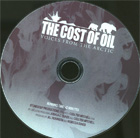
The Cost of Oil: Voices from the Arctic 2009
Distributed by Green Planet Films, 21 Columbus Ave. Suite 205, San Francisco, CA 94111; 415-377-5471
Produced by Rebecca Dukes
Directed by Coulter Mitchell
DVD , color, 42 min.
Sr. High - Adult
Economics, Environmental Studies
Date Entered: 02/05/2010
Reviewed by Michael Coffta, Business Reference Librarian, Bloomsburg University of PennsylvaniaIn the 1840s, the world relied on whale oil harvested from the Arctic Ocean off the coast of northern Alaska. While the world eventually lost interest in this area as it lost interest in whale oil, it quickly regained its interest in the region when offshore oil was discovered there. This compelling documentary examines the consequences of oil exploration and collection on the people and wildlife of northern Alaska.
The film details the threats the oil companies’ present to the environment, the economies of villages, and the ways of life of indigenous cultures. It provides a window into lives of those who revere the land, and seek to protect it. The audience is offered interviews with several petroleum company executives, to provide counterpoints to the native population’s concerns. This outstanding work provides great detail on environmental impacts, such the effects of seismic operations on whales, and the economic impacts, such as unemployment and migration.
Visually, The Cost of Oil is stunning. The film makers used a clever technique of animating selected portions of photographs to create an interesting and engaging effect. This documentary is replete with subtle but profound imagery, including views of the distortion of heat rising off land directly in front of snow capped mountains, sending the message of climate change. There are amazing shots of melting ice that would be beautiful if the reality that they represent were not so disturbing.
Unlike some interdisciplinary cause-driven works, this film skillfully moves from point to point without giving the viewer “topic-related whiplash.” That is, even though the film discusses environmental science, economics, sociology, and more, the movement between these elements is swift and smooth, all while clearly making a coherent case. This is a phenomenal documentary and essential viewing for anyone concerned with the direct and indirect consequences of petroleum usage.
Awards
- Best Documentary: Festivus Film Festival
- Best Documentary: East Lansing Film Festival